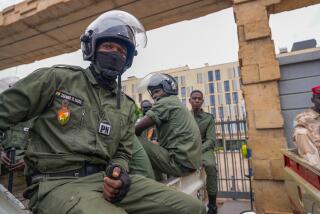PERSPECTIVE ON NIGERIA : Dawdling While a Nation Crumbles : Intervention is needed before the crisis becomes a regional catastrophe. An oil embargo could be too late.
In executing author Ken Saro-Wiwa and other minority rights activists in November, Nigerian Gen. Sani Abacha and his clique have judged that the international community is a paper tiger and little or nothing will be done. There are signs that they are right.
So far, additional measures announced by the U.S. and European governments amount to little more than marginal tightening of restrictions put in place nearly two years ago. Oil companies continue to plan for huge new investments in Nigeria.
But there are powerful reasons for an active policy of preventive diplomacy toward Nigeria. Barring international action, Nigeria’s 100 million people are heading toward a political catastrophe. If Nigeria disintegrates, so will regional stability in all of West Africa. The tentative new democracies and market economies of the region would be overwhelmed, creating a massive zone of instability prone to humanitarian tragedy and ecological disaster in which drug trafficking, illicit arms trade and disease would fester. The area would become a ripe target for Islamist extremists and would pose a serious challenge to the international community.
The signs of decay are increasing. Roads, bridges, markets, schools, clinics and other government services and public facilities have virtually collapsed; the once substantial middle class is no more; drug smuggling and international financial fraud abounds; ethnic tensions are escalating; public order is tenuous. In Saro-Wiwa’s Ogoniland and other parts of the oil-rich Niger Delta, the military continues to wage a brutal campaign of state terror.
A criminal cartel in control of what passes for a state, the Abacha clique steals an estimated one-quarter of the country’s $10 billion in annual oil revenues. Beneath Abacha, the military seethes with greed, envy and ethnic and populist resentment. Outside of the military, Nigeria’s fragile national identity is eroding under a growing religious/regional polarization pitting Muslims against Christians. While Abacha has announced a transition to civilian rule, his promise is bereft of any credibility given the series of duplicitous programs promulgated over the past 12 years.
If Nigeria’s descent into anarchy or civil war is to be averted, the military must be induced to withdraw from power rapidly and a civilian process of political reconstruction must be initiated. The country’s ethnic, religious and regional cleavages can be managed only through an open political process that takes stock of the fears, grievances and resentments on all sides and creates a new framework to enable contending groups to coexist with mutual security.
This can be brought about by an international strategy mobilized by the U.S. and combining vigorous diplomatic and societal engagement with a coherent program of meaningful sanctions. Nelson Mandela provides a crucial African voice in the search for a negotiated transition. Three components are vital to such a strategy.
First, the international community will need to assure Abacha and the military of a “soft landing,” including immunity from prosecution and cessation of efforts to freeze their assets.
Second, significant sanctions are needed, including a ban on new investment, exclusion from international sporting and cultural gatherings and a freeze on the overseas assets of regime members and supporters.
Third, the international community must resuscitate and strengthen Nigeria’s independent voices. A special allocation of funds for Nigeria’s democratic organizations and media will help.
Many opponents of the military dictatorship have called for an immediate oil embargo. While this should be held in reserve as the ultimate pressure, it will become politically feasible only after other forms of pressure have been seriously attempted. Nigeria cannot wait while political support for an oil embargo deepens. Unlike South Africa, where time was the ally of the black majority, in Nigeria time is the enemy. If an international strategy of pressured engagement is not soon mobilized, the deterioration will deepen and the chances for preventing disaster will recede. The international community will again have demonstrated its lack of resolve, and Africa will suffer.
More to Read
Sign up for Essential California
The most important California stories and recommendations in your inbox every morning.
You may occasionally receive promotional content from the Los Angeles Times.










